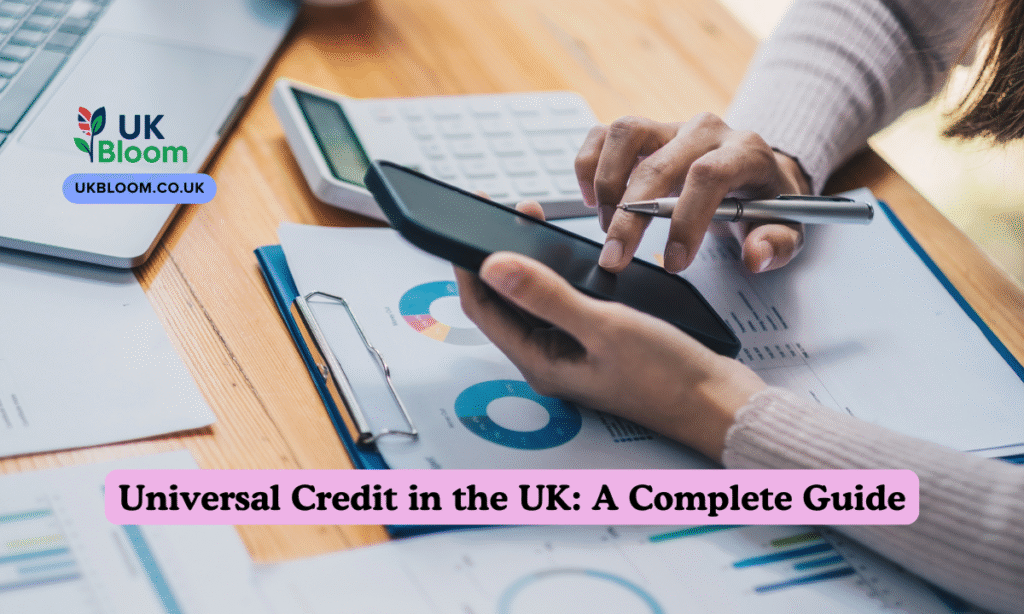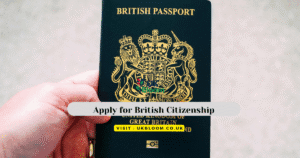At UKBloom, we understand how overwhelming settling in a new country can be—especially when it comes to understanding financial support. One of the most frequently asked questions by newcomers is: “Can I apply for Universal Credit in the UK?”
Whether you’ve recently moved, are preparing to relocate, or are helping someone adjust to life in the UK, this guide explains how Universal Credit in the UK works, who qualifies, how to apply, and what to expect during the process.
We’ll break down everything in a clear, practical way—just like a trusted friend guiding you through the system.
Table of Contents
What Is Universal Credit in the UK?
Universal Credit is a monthly benefit payment provided by the UK government to help people with living costs. It is designed to simplify and replace several older benefits, such as:
- Income Support
- Housing Benefit
- Child Tax Credit
- Working Tax Credit
- Jobseeker’s Allowance (income-based)
- Employment and Support Allowance (income-related)
It’s aimed at people who are:
- On a low income
- Out of work
- Unable to work (due to health conditions or caring responsibilities)
Unlike some legacy benefits, Universal Credit is applied for online and managed through a personal online account.
Who Can Claim Universal Credit in the UK?
To claim Universal Credit in the UK, you must meet both personal and immigration eligibility requirements.
Basic Eligibility
You must:
- Be aged 18 or over (some exceptions for 16–17s)
- Be under State Pension age
- Live in the UK
- Have less than £16,000 in savings (combined with your partner, if applicable)
- Not be in full-time education (with exceptions)
Immigration and Residency Rules
Your immigration status heavily affects your eligibility. Generally, you can’t claim Universal Credit if you’re:
- Subject to immigration control
- On a visitor visa or short-term permit
- Here without the right to reside
However, you may be eligible if:
- You have a settled status under the EU Settlement Scheme
- You’re a refugee or a humanitarian protection holder
- You have indefinite leave to remain (ILR)
- You’re a British citizen
🔍 Tip: If you hold a Skilled Worker Visa or Student Visa, you’re usually not eligible unless you meet very specific criteria. Speak to a welfare adviser or immigration solicitor for clarity.
💡 Explore our guides on [Visa Eligibility], [ILR Application], or [Working in the UK] to understand your route to benefits and residency.
How Much Can You Get Through Universal Credit?
Universal Credit amounts vary based on your:
- Age
- Living situation (e.g., single or couple)
- Children
- Health conditions
- Housing costs
Standard Monthly Allowance (2024/2025 rates):
- Single and under 25: £311.68
- Single and 25 or over: £393.45
- Couple under 25 (together): £489.23
- Couple over 25 (together): £617.60
You may also receive additional amounts for:
- Children
- Disabilities or health conditions
- Caring responsibilities
- Rent or housing costs
🏡 For example, a couple with two children and rent costs might receive a total of £1,200–£1,800+ per month, depending on circumstances.
Use the [UKBloom Benefits Estimator Tool] (coming soon) to calculate your likely entitlement.
How to Apply for Universal Credit
Applying for Universal Credit is entirely online, and the process typically takes between 30 and 60 minutes.
Step-by-Step Guide:
- Visit the official UK government Universal Credit website
- Create an account with your email and phone number
- Fill in personal and financial information
- Provide identity documents (passport, BRP card, etc.)
- Attend an initial Jobcentre appointment (usually in person or via video call)
- Wait for your decision letter and first payment, usually within 5 weeks
🔁 If you’re struggling to wait for your first payment, you can request a short-term advance.
Managing Your Claim
Once approved, you’ll receive a monthly payment into your bank account. You’ll also have to:
- Report any changes (job, relationship, housing, etc.)
- Attend work-focused interviews if you’re expected to seek employment
- Use your online account to manage tasks and messages
Failure to comply with conditions can result in payment reductions (sanctions).
Universal Credit for Students, Refugees, and Families
Students
Most full-time students are not eligible, unless:
- You have children
- You live with a partner who qualifies
- You have a disability or limited capability for work
Refugees and Humanitarian Protection Holders
If you’ve been granted refugee status, HP, or Discretionary Leave, you typically qualify for Universal Credit immediately, provided you meet the other financial criteria.
Families with Children
You may get extra support for each child. Childcare costs (up to 85%) can also be reimbursed if you work and pay for registered childcare.
Universal Credit and Working in the UK
You can work and still receive Universal Credit. The more you earn, the less you get. This is known as the taper rate.
As of 2024:
- You lose 55p of Universal Credit for every £1 earned over your work allowance (if applicable).
Work allowances apply if:
- You’re responsible for a child
- You or your partner has limited capability for work
💼 Example: If your work allowance is £379 and you earn £579, only £200 is subject to the 55% deduction.
Other Support You May Be Eligible For
Alongside Universal Credit, you might also qualify for:
- Council Tax Reduction
- Free school meals
- Healthy Start food vouchers (if pregnant or have children under 4)
- Cost of Living Payments (if eligible during specific periods)
Check local council websites or the Turn2us Benefit Calculator for more.
FAQs
Can I claim Universal Credit on a visa?
Usually no, unless you have no recourse to public funds lifted or qualify under an exemption (e.g. refugee, ILR, or settled status).
How long does it take to get Universal Credit?
It usually takes 5 weeks from your application. A short-term advance is available if needed.
Do I need a UK bank account to get paid?
Yes, payments are made monthly into a UK bank, building society, or credit union account.
What if I live with my partner?
You must apply as a couple and report both incomes and savings, even if only one person qualifies.
Is Universal Credit taxable?
No, Universal Credit payments are not taxable and do not affect your tax code.
Conclusion
Universal Credit in the UK can provide much-needed support during difficult times—whether you’re starting a new life here or facing temporary financial hardship. While eligibility depends on your immigration status and circumstances, it’s worth understanding the system and checking if you qualify.
At UKBloom, we’re here to guide you through every step of your UK journey—from understanding benefits and taxes to building a career and finding a home.
Explore our other helpful guides like [Working in the UK], [UK Cost of Living Estimator], and [Childcare and Education Advice] to make your transition easier.
Disclaimer:
This article is for informational purposes only and does not constitute legal or immigration advice. Please refer to official UK government sources or seek legal support for specific guidance.
© 2025 UKBloom.co.uk – All rights reserved.






